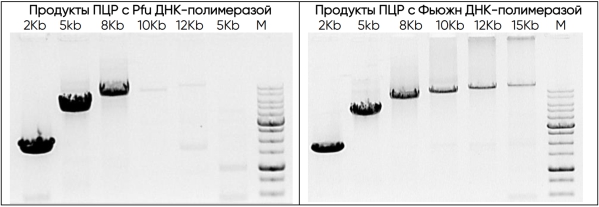High-fidelity amplification
High-fidelity DNA polymerases provide exceptional accuracy, speed and performance for all PCR applications.


These enzymes are significantly superior to Pfu and Taq polymerases in the following parameters:
-
> processivity
-
> synthesis accuracy
-
> fragment amplification rate
-
> resistance to PCR inhibitors
Comparison of synthesis of long fragments:

Analysis of salt resistance of Pfu DNA polymerase and Fusion DNA polymerase using the example of fragment amplification in the presence of KCl:

Name
Catalog #
Qty
Name
Fusion 2.0 polymerase
A modified version of Fusion DNA polymerase obtained by merging the thermostable DNA polymerase of Pyrococcus furiosus (Pfu) and the DNA-binding protein of the thermophilic archaea species Saccharolobus solfataricus (Sso7d). A number of mutations were added to Fusion 2.0 polymerase, increasing the accuracy of the enzyme by approximately 3 times or ~15 times relative to the “native” Taq DNA polymerase
Name
PCR amplification kit with Fusion DNA polymerase
A set of reagents for performing PCR with high-fidelity DNA polymerase. The kit contains individual components such as magnesium ions, a mixture of deoxynucleotide triphosphates (dNTPs) and dimethyl sulfoxide, which allows you to optimize the amplification conditions for the experimenter’s tasks.
Name
Fusion DNA polymerase (Pfu-Sso7d)
Fusion DNA polymerase consists of Pyrococcus furiosus (Pfu) thermostable DNA polymerase and thermophilic archaea DNA-binding protein Sulfolobus solfataricus (Sso7d). The Sso7d protein binds to the minor groove of double-stranded DNA and stabilizes the polymerase-template complex. Due to this, Fusion DNA polymerase has increased processivity, synthesis accuracy, amplification rate, and resistance to PCR inhibitors.
Name
PCR amplification kit with Fusion 2.0 DNA polymerase
A reagent kit for performing PCR using high-fidelity Fusion 2.0 polymerase. The kit includes individual components such as reaction buffer, magnesium ions, deox-ynucleotide triphosphate (dNTP) mixture, Fusion 2.0 polymerase, nuclease-free water, and PCR Enhancer, enabling optimization of amplification conditions for the researcher's specific needs.